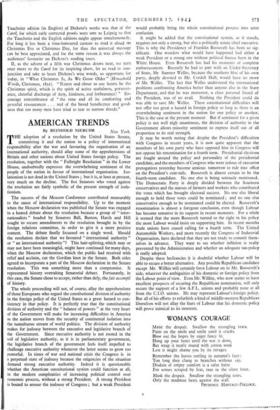AMERICAN TRENDS
By REINHOLD NIEBUHR New York.
The success of the Moscow Conference contributed measurably to the cause of international responsibility. Up to the moment when the Moscow declaration was published the Senate was engaged in a heated debate about the resolution because a group of " inter- nationalists " headed by Senators Ball, Burton, Hatch and Hill sought to secure amendments to the resolution brought in by the foreign relations committee, in order to give it a more positive content. The debate finally focussed on a single word. Should the resolution declare that we favoured "international authority" or "an international authority "? This hair-splitting, which may or may not have been meaningful, might have continued for many days, when the Moscow declaration, which the public had received with relief and acclaim, cut the Gordian knot in the Senate. Both sides agreed to incorporate a part of the Moscow declaration in the Senate resolution. This was something more than a compromise. It represented history overtaking Senatorial debate. Fortunately, in this case, the Senate chose to accept, rather than defy, the fait accompli of history.
The whole proceeding will not, of course, allay the apprehensions of those Europeans who regard the constitutional division of authority in the foreign policy of the United States as a great hazard to con- sistency in that policy. It is perfectly true that the constitutional division of authority and the "balance of powers" at the very heart of the Government will make for increasing difficulties in America as the nation moves from the security of continental isolation into the tumultuous stream of world politics. The division of authority makes for jealousy between the executive and legislative branch of the Government. Since executive authority is not rooted in the soil of legislative authority, as it is in parliamentary government, the legislative branch of the government feels itself impelled to challenge executive authority whenever the latter seems to grow too powerful. In times of war and national crisis the Congress is in a perpetual state of jealousy because the exigencies of the situation demand strong executive authority. Indeed it is questionable whether the American constitutional system could function at all, in the modern complexities of increasing political control over economic process, without a strong President. A strong President is bound to arouse the jealousy of Congress ; but a weak President would probably bring the whole constitutional process into utter confusion.
It might be added that the constitutional system, as it stands, requires not only a strong, but also a politically astute chief executive. This is why the Presidency of Franklin Roosevelt has been so sig- nificant. One wonders what would have happened had either a weak President or a strong one without political finesse been in the White House. Even Roosevelt has had his moments of complete embarrassment. Recently he had to part with an Under-Secretary of State, Mr Sumner Welles, because the southern bloc of his own party, deeply devoted to Mr. Cordell Hull, would have no more of Mr. Welles. The fact that Welles understood the international problems confronting America better than anyone else in the State Department, and that he was moreover, a close personal friend of the President, was of no avail. Nothing the President could do was able to save Mr. Welles. These constitutional difficulties will not offer too great a hazard in foreign policy so long as there is an overwhelming sentiment in the nation for one policy or another. This is the case at the present moment. But if sentiment for a given policy is not well nigh unanimous, the division of authority in the Government allows minority sentiment to express itself out of all proportion to its real strength.
It may be worth noting that despite the President's difficulties with Congress in recent years, it is now quite apparent that the members of his own party who have opposed him in Congress will not oppose his renomination for a fourth term. Presidential elections are fought around the policy and personality of the presidential candidate, and the members of Congress who were jealous of executive prerogatives yesterday become anxious tomorrow to ride into office on the President's coat-tails. Roosevelt is almost certain to be the fourth-term candidate. No one else is being seriously mentioned. The Democratic Party is deeply divided between the Southern conservatives and the masses of farmers and workers who contributed the votes which has brought electoral success. No one else liberal enough to hold those votes could be nominated ; and no one else conservative enough to be nominated could be elected. Roosevelt's renomination is almost a foregone conclusion, even though Labour has become tentative in its support in recent moments. For a while it seemed that the more Roosevelt turned to the right in his policy the more Labour would insist on supporting him. In recent months trade unions have ceased calling for a fourth term. The United Automobile Workers, and more recently the Congress of Industrial Organisation, have declared that they are not ready to commit them- selves in advance. They want to see whether inflation is really prevented by the Administration and whether an adequate tax-policy is really adopted.
Despite these hesitancies it is doubtful whether Labour will be able to secure a better alternative. Any possible Republican candidate except Mr. Winkle will certainly force Labour on to Mr. Roosevelt's side, whatever the ambiguities of his domestic or foreign policy from the Labour point of view. Even Mr. Willkie, who now seems to have excellent prospects of securing the Republican nomination, will only secure the support of a few A.F.L. unions and probably none at all from the C.I.O. unions. He may represent Labour's foreign policy. But all of his efforts to refurbish a kind of middle-western Republican liberalism will not allay the fears of Labour that his domestic policy will prove inimical to its interests.


























 Previous page
Previous page